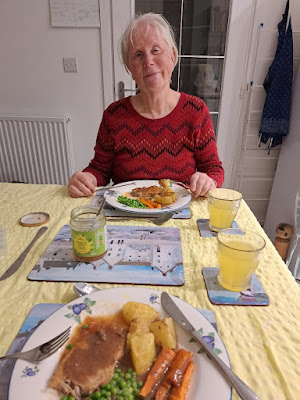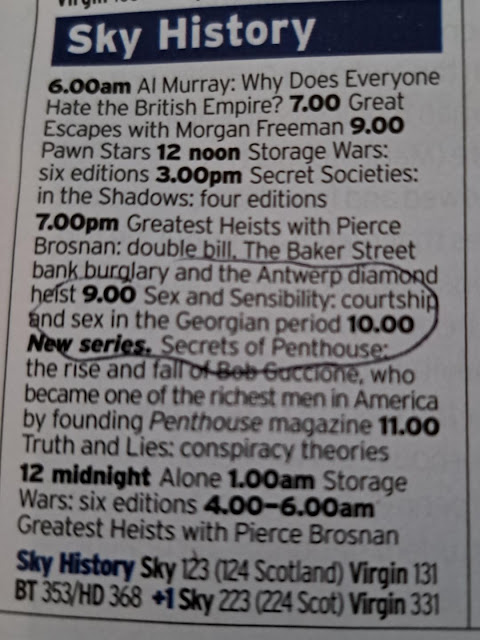11:00 We drive from our home in Malvern to Ashchurch, just outside Tewkesbury, so that Lois can attend her church's Sunday Morning Meeting.
We believe, on some very good grounds, that, thanks to my vigilance on checking local news websites and parish notice boards, we may be one of the first cars to try getting through the little local town of Upton-upon-Severn from the north since the floodwaters subsided and the 5-day road closure finally ended this morning.
Take my tip: UPTON PARISH NOTICEBOARD is generally first with the really big news, which is nice!
Yes, Upton Parish Notice Board doesn't just give details of who's taking the services in the parish church (Rev. Barry Unwin in case you're interested!) - it's that too, but it's so much more !!!!
flashback to 2021: local Anglican/Episcopalian vicar Rev. Barry Unwin,
seen here in drier, happier times, before the Floods, giving his 2-minute message
on one of the many country back-roads you find in these parts
11:30 And, as we drive past the Warner's Supermarket and petrol station on Hanley Road, even though there aren't any cheering crowds, admittedly, we still somehow feel a bit like veteran journalist Max Hastings of the London Evening Standard, the first British reporter into Port Stanley, the Falkland Islands, after the "Argies" surrendered in 1982 - remember that?
And in a strange way, we also feel a bit like John Simpson, the BBC reporter who "liberated" Kabul after the Taliban withdrew, in 2001.
[Aren't you overplaying this "we liberate Upton" story just a little bit? - Ed]11:15 We arrive at Ashchurch Village Hall just as this week's visiting preacher, Mark, from Knowle & Dorridge, is bringing the Bible Hour to a close, so we tiptoe in at the back of the hall and take our places as unobtrusively as we can.
we tiptoe into the Village Hall, just as Mark, this week's visiting preacher
from Knowle & Dorridge, sitting on the platform next to today's president,
David (left), is bringing the Bible Hour to a close. Lucy's dog (name?,
foreground to the right) eyes me suspiciously - I just LOVE that dog,
and I'm not strictly a "doggy person" - like me, he's just so quiet and soulful!
Awwwwwwwwwww he's so sweet !!!!
Knowle & Dorridge is a place somewhere near Birmingham, and it's famous, above all, for its amateur cricket club. Lois remembers the town fondly, because when her parents used to drive the family there in the 1950's, she and her little brother Andrew, always used to start singing their self-penned pastiche song,
"Knowle & Dorridge, Knowle & Dorridge / Go together like a horse and carriage (Dad was told by Mother / You can't have one without the other)".
You may have heard the song on the radio - I think Frank Sinatra wrote and asked permission to record it, but I'm not sure Lois and Andrew wanted that kind of fame at such a tender age. A missed opportunity perhaps?
[That's enough whimsy! - Ed]
13:45 Lois and I drive home, with just a quick stop at the OneStop shop on Poolbrook Road, because we forgot to take anything out of the freezer this morning for our tea tonight. Oops!
And there's more evidence here of the 'Halloween Fever' that's gripping this area at the moment - the shop is now officially a "zombie zone", with an official-looking "do not pass" type of tape-malarkey stuck over the entrance-door, but Lois goes in anyway - she really wants a couple of their delicious pork chops.
Don't you just love a woman with spirit? I know I do !!!!
When she comes out of the shop, I ask her what it was like, but she doesn't want to talk about it, so fair enough - I imagine it was pretty traumatic, particularly if there was a zombie on check-out, as there normally is at this time of year - you just can't get the staff on a Sunday, can you.
Yikes !!!!
if you look carefully through the glass in the left-hand panel, you may be able to make out the shadowy figure of Lois,
dodging the zombies in the shop's notorious Aisle 1 - yikes!!!!
What a woman I married !!!!!!
14:30 We arrive home, still feeling a bit shattered after a busy week of hosting, and we go upstairs to "plug ourselves in" using our "virtual recharger", and we just stay there like that for a couple of hours.
16:30 Later I browse the Quora forum website and I'm delighted to see that one of our favourite Quora pundits, historian Alex Mann, has been weighing in on the vexed subject of "Why did Christianity spread so quickly in the Roman Empire?".
There are so many stupid questions asked by complete idiots on this Quora website, with so many sarcastic replies from the website's resident pundits, that it's refreshing to see a serious question for once, and one that you don't often hear about.
Alex writes,
"Christianity did not spread fast at all. It was around during the reign of Emperor Tiberius, starting sometime around 31–33 AD, but it remained a niche offshoot of Judaism for some 300 years, never being the majority [religion] in any way.
For those first 300 years, it never did well. It remained small and mostly irrelevant, occasionally drawing the ire of the emperor. Then everything changed.
The crisis of the third century was a defining moment for the Roman Empire. The government collapsed, two thirds of the empire declared independence, numerous barbarian tribes invaded what remained of the empire, the economy collapsed, famine gripped the populace, and even a pandemic went around."
He continues, "The Roman government- caught up in local conflicts - was unable to respond to the needs of the people well. In this void, Christianity, one of the [few] organized religions in the Empire, stepped up big.
Christians fed the poor, treated the sick, and helped alleviate the intense poverty of the Empire for decades while the government figured everything out.
Eventually, an emperor named Aurelian put the pieces back together - ending the civil wars, defeating the barbarians, and stabilizing the border.
It was the Emperor Aurelian that made the key change, Alex writes. Traditional Roman religion was polytheistic, and their pantheon included not just the Roman gods, but all the other gods in contemporary cultures - Egyptian, Greek, or Celtic even, whatever.
Aurelian selected one particular god, the sun-god Sol Invictus, for his personal religion, and this crucially laid the foundations for acceptance of Christianity, Alex believes, by planting the idea of monotheism in people's minds.
But not yet - Christianity's time hadn't quite come. After Aurelian died, his successor Diocletian tried to stamp out Christianity, but his attempts were ineffective, and the religion remained strong, although still very much a minority faith.
Alex concludes, "Then Constantine won a civil war, became the sole emperor, and adopted Christianity. There is some debate here. Constantine may have worshiped Sol Invictus like Aurelian or he may have just used the Christians to gain standing, but, regardless, he brought it out of the dark and made it a legitimate religion.
From there it spread more and more year by year. Emperors (with only a few exceptions) were Christian and supported the expansion of the church. Following the emperor’s religion was always a good way to get “good boy” points so more and more jumped on the bandwagon.
By the time Rome fell, Christianity had cemented itself throughout the empire as the dominant religion by a mile.
Fascinating stuff !!!!
18:30 Battered and bruised by our day, Lois and I seem nevertheless to enjoy, even more than usual, the lovely pork chops that those zombies sold Lois earlier in the day - yum yum!
the pork chops those zombies sold us - yum yum!
21:00 We settled down on the couch and wind down for bed with another episode of the Sky History Channel's fascinating series, "Sex and Sensibility", all about sex and courtship in the Georgian period of British history: 1714-1837, which, for both of us, is perhaps our favourite period.
I think we like it, because there are so many parallels between the Georgian period and our own times, many more parallels than are offered by the much more buttoned-up world of the Victorian era that followed: 1837-1901.
Presenter Dr Kate Lister, author of "A Curious History of Sex", sets the scene:
Well were they or weren't they? Fact-check this, please Lois haha!
It's always helpful watching series on Georgian sex and courtship if Lois is by my side to comment, because there isn't much that she doesn't know already about sex and courtship in this period, from her reading not just of history books but alsoof historical novels set in the period.
And it's nice also that so many of the dramatic scenes have been filmed in Bath, a city Lois and I know well.
looking for a wife or husband in Bath, Somerset
It turns out that Lois is critical of this documentary on many grounds. The series stresses the important part played by the so-called "season" of lavish balls in London in enabling reasonably well-to-do young people to find a partner in a controlled setting, possibly watched from the side-lines by anxious parents.
"The Season" was timed to coincide as far as possible with sittings of Parliament, because many young marriageable peers, including many a "good catch", would have been in London during these months, away from their "country seats", and so available to attend balls in the capital.
What a madness that was !!!!!
But Lois questions why no mention is made of other, less elevated, less controlled ways of "hooking up" with somebody, or finding a wife or husband - like going to taverns, or going to London clubs like Almack's, popularly known at the time as "the marriage mart", Lois says.
an "odd couple" dancing at Almacks Club, the so-called "marriage mart"
Alternatively there were the open-air dances in places like the Vauxhall Gardens or Ranelagh Gardens, with their dozens of little grottoes and secluded nooks, which prostitutes could also access and make use of. The authorities tried to keep them out, but with little success, Lois says.
What a crazy world they lived in, back in those far-off times !!!!!
22:00 We go to bed - zzzzzzzz!!!!!

























No comments:
Post a Comment